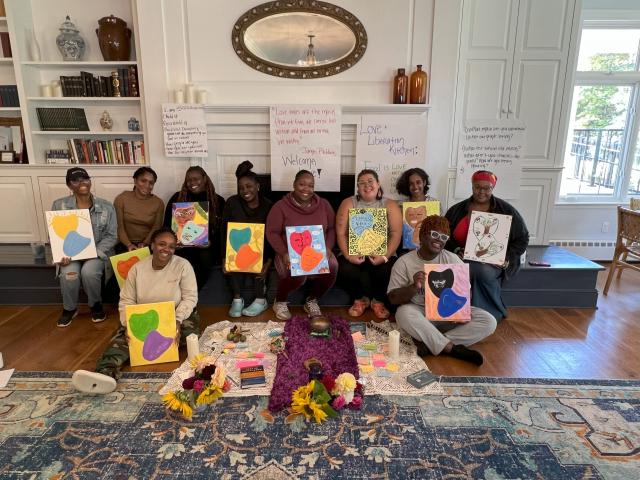Coming out of the pandemic, we heard increasing calls from our Racial Justice and Housing & Homelessness grantees for assistance with addressing burnout, stress and, in some cases, turnover among front-line staff. So we partnered with Trinity grantee the BREATHE Collective to launch Who Keeps the Keeper (WKTK), a nine-month program designed to help combat burnout and exhaustion and promote self-care and healing for our Keepers, those working tirelessly on the front lines of our movement for equity, justice, and safety.
WKTK incorporates restorative practices to encourage connections and community and creates a safe space for our Keepers to explore what self-care can look like for a social justice practitioner.
In March 2023, we held our Collective Care & Justice Retreat at the Trinity Retreat Center in West Cornwall, Connecticut, where we welcomed our inaugural cohort of WKTK. For three days, our cohort of 24 Keepers learned tools, practices, and new traditions for self and collective care for themselves and their communities.
Over the next six months, the cohort convened for virtual and in-person check-ins, coaching sessions, and other activities designed to help participants practice collective care. The BREATHE Circles team and I watched our Keepers use tools from the program to improve communication and set boundaries in and outside of work. We also watched our Keepers use the connections and WKTK network to navigate personal challenges.
We reconvened last month for our Who Keeps the Keeper Fall Retreat to see where participants were on their individual self-care journeys. Leading up to the retreat, we were eager to see how many of our Keepers still used their self-care practices and how colleagues and even loved ones reacted to their newfound commitment to care. We were also curious to see if our Keepers’ desire for self-care survived the reality of nonprofit work. BREATHE Circles opened the retreat by having our Keepers share updates on their self-care journeys and set their intentions for our time together.
Over the next three days, the BREATHE Circles team led sessions that allowed Keepers to explore new self-care practices. Quandisha German and Carmen Webb led a session called “Love & Liberation Kitchen,” where we explored the concept of “food as medicine.” We discussed the role high-quality nourishment plays in our overall well-being, how our dietary choices during challenging periods can contribute to anxiety and stress, and the role of food in promoting healing, self-discovery, and community-building.
Ashley Ellis led sessions that taught Keepers how to use movement and bodywork as another strategy for detecting and coping with stress. Keepers explored the use of yoga as a tool to cope with stress and anxiety and to heal emotional wounds. On our last night at the Retreat Center, we reflected on the many roles we have in our lives and how the roles we play shape how we show up in the world — and ultimately how we see ourselves.
We left the retreat feeling nourished and nurtured. Our Keepers expressed gratitude for being a part of the WKTK community and for an opportunity to rest. As a convener, I left the retreat feeling satisfied. Six months into WKTK, most of our Keepers are still incorporating self-care practices and embracing the concept of rest in a sector and culture that does not always support it.
Beyond that, our Keepers have a safe space and community in the WKTK network they can tap into for support. We know the demands on our violence interrupters, social workers, and community organizers will not change, but equipping them with the right tools and systems of support is critical to sustaining our Keepers in this work.
The first program year of WKTK officially ends in December. We will release applications for Cohort 2 of WKTK in early January.
